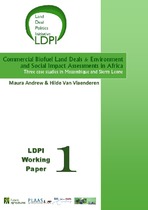Commercial biofuel land deals & environment and social impact assessments in Africa: Three case studies in Mozambique and Sierra Leone
Abstract
The rapid increase in attempts by foreign investors to acquire large tracts of land in Africa for biofuel
developments has generated substantial concern about their potential negative impact on the
communities living in the targeted areas. This includes concerns about the impact on local residents’
livelihoods, their access to land, natural resources and labour, and their food security.
This paper examines three case studies of proposed biofuel developments in Mozambique and Sierra
Leone in terms of their social displacement impacts and the extent to which such impacts can be avoided
or minimised. The case studies show that even in areas with low population densities and settlements
concentrated in villages where it is easier to minimise displacement impacts, livelihood displacement
impacts still cannot be entirely avoided due to communal and scattered land use in most rural areas.
Environmental and Social Impact Assessment (ESIA) processes have changed the location, size and
boundaries of developments to reduce displacement impacts, but more mitigation measures — such as
outgrower schemes and land dedicated to food production — can provide further livelihood restitution
and avoid food security impacts. The three biofuel ventures also highlight the influence of tenure security
for local land right holders in determining the nature of the land deals and the consultation
processes: cases where land leases are made with central government seem to provide fewer incentives
for developers to negotiate directly with local communities and provide them with lower levels of
compensation.

